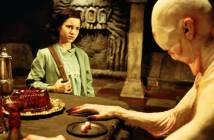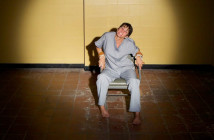Who would have thought: there’s a gay-themed movie on Netflix that isn’t a boring and pukey attempt at filmmaking. I’m talking about Getting Go: The Go Doc Project, a mockumentary-style film directed by Cory Krueckeberg. It keeps with many of the tropes of gay moviemaking: shallow, unrequited loved salted and peppered with random acts of roughly choreographed oral and anal sex. But The Go Doc Project had a vision, a style, a relatively natural script, and an unexpected narrative arc that left me fully charmed by the end.
The movie stars the adorable, almond-eyed Tanner Cohen as Doc, and Matthew Camp as the sexy and seductive Go. Doc is the first of the two we meet, and he’s seated in his Manhattan apartment before his MacBook Pro jerking off on camera for his tens of adoring blog fans. The time spent masturbating for the web cam is mixed with his stalking of a go-go dancer (conveniently named Go). It’s not Ted Bundy stalking, but rather the more innocent Facebook variety. Though we’re not given much context of how Doc first encountered Go or where the infatuation took root, he isn’t shy about letting us in on his plan: after a night of heavy drinking mixed with cyber sex play, he sends Go an email offering him the starring role in a documentary about his career as a go-go dancer.
Sound a bit cliché? Yes, the premise summarized doesn’t have much hope, and normally I’d begin tuning out after Doc pressed the “Send” button on the email, but the mockumentary approach gives the film both style and heart — we only ever see what’s happening through the lens Doc’s iPhone camera, much how a reader’s view is limited to certain channels of perception in an epistolary novel.
The following course of events isn’t difficult to figure out: after some back and forth Go agrees to film with Doc to make his movie. Doc interviews Go in his apartment by day while shadowing at the nightclubs he performs in by night. Eventually a long night turns into flirtation between the two, which leads to the aforementioned choreographed oral and anal sex.
Does a love story ensue? Yes and no, but I will leave that to your viewing pleasure to find out more. This is where the whole film could go terribly wrong and it does not. Some of the plot points are canned, like Go and Doc’s pillow talk about the current state of gay culture and its impending destiny — a conversation I don’t recall with detail and don’t wish to. But then there are the quieter and genuine moments, such as Go talking casually about why he is a go-go dancer while making a peanut butter and jelly sandwich, or when he and Doc binge-eat takeout from a Brooklyn deli. Doc asked Go how he can eat so much and still look the way he does. Go uses the opportunity to tell Doc he’s beautiful. Not to gush, but the exchange gave me a brief wave of goose bumps.
While the movie wouldn’t exist without the performances of either Tanner Cohen or Matthew Camp, there’s something to be said for the both of them as young actors. I don’t know anything about them aside from their names in the IMDb credits, but there’s something transfixing about Camp’s delivery in the interview scenes of the movie. When he speaks he’s real: I don’t know if he’s drawing from his own real-world experiences or if it’s all a total fabrication, but either way, he sold me on his performance throughout.
Tanner Cohen’s finale, however, is where all of the endgame charm came into play for me. It’s an ending I wasn’t expecting, and while it’s one of self-discovery, Cohen’s Doc actually discovers something about himself. It’s not just some self-indulgent scripted stunt. And for that I too discovered something from Getting Go: The Go Doc Project, and I hope you will as well.



